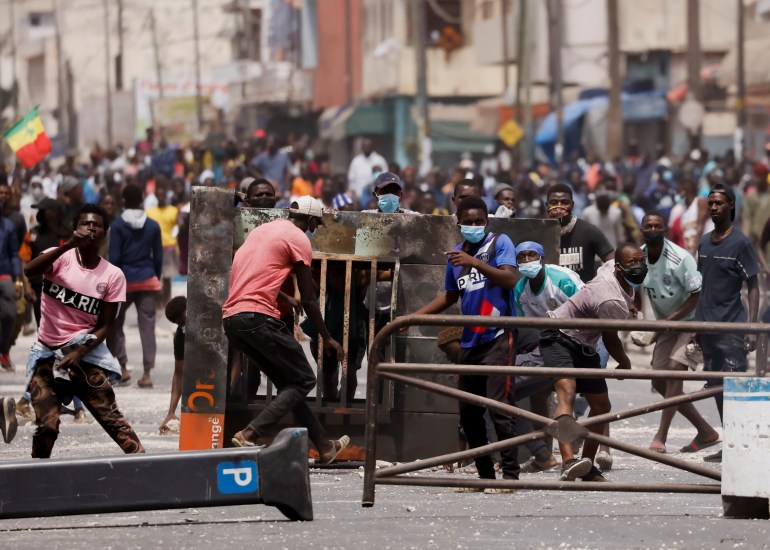French magazine Le Point said that the bloody demonstrations in Senegal since the beginning of this month in protest against the arrest of prominent political opponent Osman Sonko show popular rejection of a system of government that is seen as a threat to democracy.
Sonko (46 years) - who belongs to the opposition party "Bastiv" (Patriots) - was ranked third during the presidential elections that the incumbent President Macky Sall won in February 2019, and was arrested on the third of this month after being accused by a worker in a massage parlor. By raping her and threatening to kill her, he denied these allegations, saying that they were an attempt by the president to "destroy him politically" ahead of the upcoming presidencies in 2024, which the government denied.
But the French magazine confirms that despite the official denial, the issue of a third term for the current president appears in the background of the current events, although the president has not yet expressed a clear position in this regard, and the Senegalese opposition fears that the Osman Sonko case will be a prelude to blocking it before announcing the president’s candidacy.
She adds that the files of some prominent opponents, such as the case of Khalifa Sall, the former mayor of Dakar, and before that the case of Karim Wade (son of former President Abdallah Wade), who were removed from the political scene after being accused of embezzlement cases during Sale's period, are still pending in the minds.
The magazine considers that the current demonstrations quickly bypassed the person of the opposition, Osman Sonko, after they were limited in their beginning to protests led by supporters and supporters of him and his party, and turned into an explicit expression of the depth of the economic crisis experienced by Senegalese society, which increased the impact of the Corona pandemic.
It also expresses popular frustration and a loss of confidence in the government, especially among young people whom Sall once described as "lost loafers" and who are now at the forefront of large numbers of the legions of demonstrators in the street.
In addition, the current protests reflect - according to the magazine - the extent of popular skepticism about the competence of the ruling class and the political system as a whole.
Amin, a contractor in Dakar who voted in 2012 to cut the road to a third presidential term for his rival Abdullah Wade, says, "The elevator is idle ... the money is now in the possession of a corrupt ruling minority, and the judiciary is run with double standards .. This accumulation is what led to the extent of resentment and anger." "What we are witnessing now. It goes beyond the Sonko person, and it is only an alternative option to draw a break with the current system ... We have nothing to lose."
Protests have killed at least 5 people so far across the country (Reuters)
A painful blow
Sampo Biagi, president of the Senegalese Journalists Association for Cooperation and Solidarity (APRES), believes that the protests and violence that took place, and the attacks on journalists and some media outlets, “threaten the path of democracy and deal a painful blow to freedom of expression in the country. ".
Since last Thursday, the Internet has been partially cut off, and directives have been issued to the security forces to disperse the demonstrators, including journalists, during the protests of the third of March, and the broadcasts of two local channels accused by the authorities of supporting the demonstrations by broadcasting the protests live, which is considered by the organization Reporters Without Borders (RSF) is a violation of freedom of the press and the media.
The magazine concludes that a large segment of Senegalese believe that the arrest of Osman Sonko and the government's insistence on dealing with the current demonstrations as "terrorist acts" - in the words of Senegalese Interior Minister Antoine Felix - puts democracy in the country in front of an imminent danger, and makes defending the freedom of the detained opposition a means. In order to preserve the democratic path and ensure justice for all.

